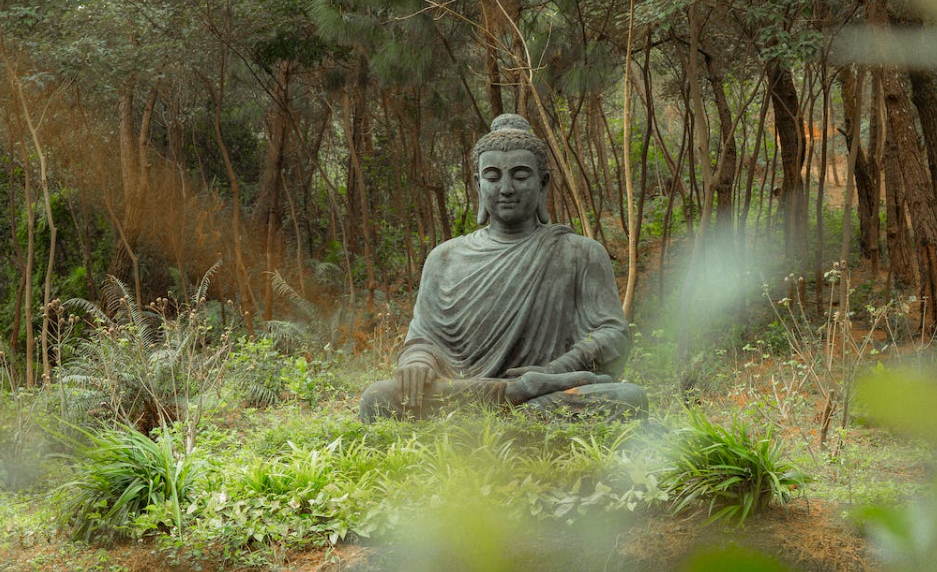Meditation Vs Contemplation
Learn the difference between meditation and contemplation, as well as its systematic approach to observing the mind, body, and emotions.

Selfpause Affirmation App
Download the app to get 1,000’s of affirmation meditations and everything you need to write, record and listen to your own.
The word contemplation is derived from the Latin prefix “con” (with) and the root “templum” (temple). In ancient times, temples were built at higher elevations so that people could see the world from a higher perspective. As such, contemplation is the act of seeing with the help of the divine. Conversely, meditation derives from the Latin verb “meditor,” which has no spiritual connotations.
Contemplation is more spiritually derived

Meditation is a practice of observing silence and focusing on God. Contemplation is a similar practice, though it requires the participation of the self. When a person is in contemplation, they feel a greater union with God and experience an intensified longing for God. They also feel less enamored with worldly things.
Contemplation is a critical moment in spiritual growth. Without contemplation, we may be lost in a meaningless struggle, and may even slide backward in our spiritual growth. In the Bible, St. John teaches us that spiritual growth is not possible without contemplation, and that a lack of contemplation can cause spiritual stagnation and regression. Therefore, he clarifies the nature of contemplation and draws the proper norms for its practice. In the Christian tradition, contemplation is characterized by the emergence of new attitudes and cooperation.
Despite its popularity, many people do not fully understand contemplative practices. The process of contemplation is difficult and often uncomfortable. It involves a long stretch. The goal is to establish a deeper connection with God and inner wisdom. This spiritual practice is a powerful tool to help us reach our spiritual goals. It is a practice that can be used for many purposes.
The difference between contemplation and meditation is in the method used. In meditation, one may be able to sit and observe for a period of time, while contemplation involves the conscious focusing of the mind. The practice of contemplation is a form of meditation that has been popularized in the western world by a practice known as mindfulness meditation.
While meditation can help a person reach a higher perspective, contemplation is much more derived from the Divine. Using contemplation as a method of prayer will condition one’s endurance for more advanced endeavors. Spiritual beginners should strive to use contemplation as a tool in their spiritual practice.
When practicing contemplation, one must have a good posture. The chin and tongue should be relaxed and the eyes should be closed. Then, the practitioner must focus on the object of contemplation. This is done by scanning his environment, choosing one object that he can focus on and paying careful attention to. After this, he or she should let the object be.
It burns away all notions of time

Meditation is a great way to eliminate the worries and stress of everyday life. It can be a daily ritual or you can just find a quiet place to meditate. You can do it anywhere, from your car to the waiting room at the doctor’s office. It can relieve your stress and help you think more clearly.
It is a systematic exploration of life’s many questions

The process of meditation involves the systematic exploration of the inner life. It enables the individual to experience a higher state of consciousness. Moreover, it helps the individual to manage stress, improve health, and develop long-term strategies for dealing with the complexities of life. It can also lead to spiritual experiences, self-knowledge, clarity, and liberation.
The researchers focused on two central questions: why people begin meditating, and why they continue to do so. Moreover, they explored the differences among people with different personalities and different spiritual backgrounds. The findings suggest that people start meditating for different reasons and may develop different practices depending on their personal experiences.
It is a more systematic exploration of the present moment

Meditation is a more systematic exploration of the moment, or “peripheral vision.” It is an ability to remain present in the moment despite the distractions around us. It is an ancient practice embedded in cultures from India to Indigenous America. It is also a vital part of many religions and martial arts. It has been practiced for thousands of years. In our fast-paced world, where technology and communication are instantaneous, it is important to ground ourselves. The only way to do that is through awareness of the present moment.
In addition to this, meditation may lead to a shift in self-referential and affective processing. It can improve health and relieve stress. It also improves brain function. The benefits of present-moment awareness include enhanced health, better mood, and lower stress. However, it is important to understand that this practice is not impulsive or hedonic. It is a more systematic way of observing the mind, body, and emotions.
The word contemplation is derived from the Latin prefix “con” (with) and the root “templum” (temple). In ancient times, temples were built at higher elevations so that people could see the world from a higher perspective. As such, contemplation is the act of seeing with the help of the divine. Conversely, meditation derives from the Latin verb “meditor,” which has no spiritual connotations.
Contemplation is more spiritually derived

Meditation is a practice of observing silence and focusing on God. Contemplation is a similar practice, though it requires the participation of the self. When a person is in contemplation, they feel a greater union with God and experience an intensified longing for God. They also feel less enamored with worldly things.
Contemplation is a critical moment in spiritual growth. Without contemplation, we may be lost in a meaningless struggle, and may even slide backward in our spiritual growth. In the Bible, St. John teaches us that spiritual growth is not possible without contemplation, and that a lack of contemplation can cause spiritual stagnation and regression. Therefore, he clarifies the nature of contemplation and draws the proper norms for its practice. In the Christian tradition, contemplation is characterized by the emergence of new attitudes and cooperation.
Despite its popularity, many people do not fully understand contemplative practices. The process of contemplation is difficult and often uncomfortable. It involves a long stretch. The goal is to establish a deeper connection with God and inner wisdom. This spiritual practice is a powerful tool to help us reach our spiritual goals. It is a practice that can be used for many purposes.
The difference between contemplation and meditation is in the method used. In meditation, one may be able to sit and observe for a period of time, while contemplation involves the conscious focusing of the mind. The practice of contemplation is a form of meditation that has been popularized in the western world by a practice known as mindfulness meditation.
While meditation can help a person reach a higher perspective, contemplation is much more derived from the Divine. Using contemplation as a method of prayer will condition one’s endurance for more advanced endeavors. Spiritual beginners should strive to use contemplation as a tool in their spiritual practice.
When practicing contemplation, one must have a good posture. The chin and tongue should be relaxed and the eyes should be closed. Then, the practitioner must focus on the object of contemplation. This is done by scanning his environment, choosing one object that he can focus on and paying careful attention to. After this, he or she should let the object be.
It burns away all notions of time

Meditation is a great way to eliminate the worries and stress of everyday life. It can be a daily ritual or you can just find a quiet place to meditate. You can do it anywhere, from your car to the waiting room at the doctor’s office. It can relieve your stress and help you think more clearly.
It is a systematic exploration of life’s many questions

The process of meditation involves the systematic exploration of the inner life. It enables the individual to experience a higher state of consciousness. Moreover, it helps the individual to manage stress, improve health, and develop long-term strategies for dealing with the complexities of life. It can also lead to spiritual experiences, self-knowledge, clarity, and liberation.
The researchers focused on two central questions: why people begin meditating, and why they continue to do so. Moreover, they explored the differences among people with different personalities and different spiritual backgrounds. The findings suggest that people start meditating for different reasons and may develop different practices depending on their personal experiences.
It is a more systematic exploration of the present moment

Meditation is a more systematic exploration of the moment, or “peripheral vision.” It is an ability to remain present in the moment despite the distractions around us. It is an ancient practice embedded in cultures from India to Indigenous America. It is also a vital part of many religions and martial arts. It has been practiced for thousands of years. In our fast-paced world, where technology and communication are instantaneous, it is important to ground ourselves. The only way to do that is through awareness of the present moment.
In addition to this, meditation may lead to a shift in self-referential and affective processing. It can improve health and relieve stress. It also improves brain function. The benefits of present-moment awareness include enhanced health, better mood, and lower stress. However, it is important to understand that this practice is not impulsive or hedonic. It is a more systematic way of observing the mind, body, and emotions.
Our Top FAQ's
Meditation and contemplation are often considered to be similar or related practices, but there are some key differences between the two. Meditation typically involves focusing the mind on a particular object or thought, such as the breath, a mantra, or a visualization, in order to cultivate mindfulness, concentration, and a sense of inner calm. Contemplation, on the other hand, involves more of a reflective or introspective practice, in which the individual considers a particular idea or concept, often from a spiritual or philosophical perspective, in order to gain deeper insight and understanding.
While there are some similarities between meditation and contemplation, they are not necessarily interchangeable. Each practice has its own unique characteristics and benefits, and they may be used in different ways to support different goals or outcomes. For example, meditation may be used to cultivate a sense of calm and clarity in the present moment, while contemplation may be used to explore deeper philosophical or spiritual ideas.
The practice of meditation and contemplation can offer a range of benefits, both physical and mental. Regular meditation and contemplation can help to reduce stress and anxiety, improve focus and concentration, and increase feelings of well-being and inner peace. Additionally, these practices may also have positive effects on physical health, such as lowering blood pressure and improving immune function.
There are many different techniques and methods associated with meditation and contemplation, and the specific approach used can vary depending on the individual and the context in which the practice is being done. Some common techniques for meditation include focused attention, open monitoring, and loving-kindness meditation, while common techniques for contemplation may include prayer, journaling, or reading and reflecting on spiritual texts.
Meditation and contemplation are practices that have been embraced by many different religious and spiritual traditions around the world. In some traditions, these practices are considered essential components of spiritual development and are integrated into daily spiritual practices. In other traditions, meditation and contemplation may be seen as complementary or supplementary practices that can support and enhance the individual’s spiritual journey.
